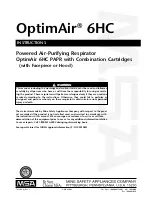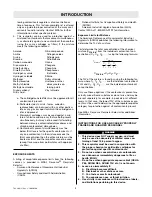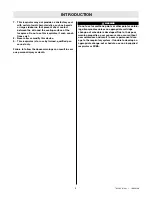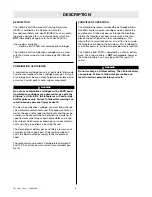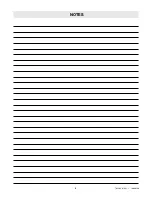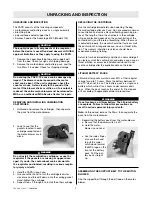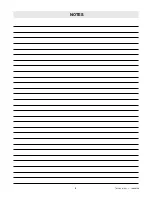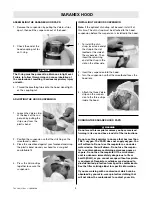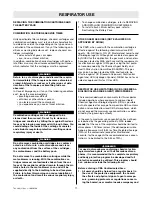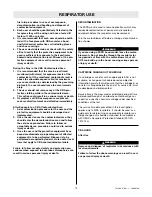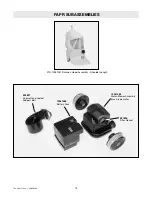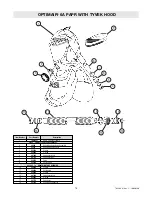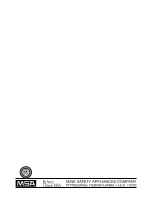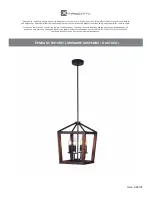
UNPACKING AND INSPECTION
UNPACKING AND INSPECTION
The PAPR consists of the following components:
• motor-blower and battery pack as a single assembly
• breathing tube
• polyurethane-coated support belt
• Saranex hood or the Advantage 3000 (Model 3100)
Thoroughly inspect all components of the respirator
before the device is used. Read and observe all NIOSH
approval limitations as they apply to using the PAPR.
1. Remove the hood, breathing tube and support belt
from the box. Check for signs of shipping damage.
2. Remove the motor-blower and battery pack, and the
two filters if included. Check for shipping damage.
Do not drop the PAPR. The case can be damaged by
impact. The blower can be loosened or the motor
shaft can be bent. If the unit is dropped, check the
case for cracks. Listen closely to the sound of the
motor. If the blower sticks or rattles, or if air output is
reduced, the entire motor-blower must be returned to
MSA or an authorized MSA Service Center for repair.
REMOVING AND INSTALLING COMBINATION
CARTRIDGES
1. Unthread and remove the cartridges, then separate
the pack from the motor-blower.
2. Look to see that the
gaskets located in each
cartridge receptacle on
the motor-blower are in
place.
Do not install the combination cartridges, or use the
respirator if the gaskets are missing or appear dam-
aged. If you do, the contaminant can be drawn into
the respirator and inhaled, resulting in serious respira-
tory injury or death.
3. Hold the PAPR in one hand.
4. Use your other hand to turn the cartridge/canister
clockwise and thread it down onto the sealing gasket.
Hand-tighten the cartridge.
5. Repeat steps 2 through 4 to install the other cartridge.
REPLACING THE CARTRIDGE
Use the cartridge immediately upon opening the bag.
Discard cartridge after each use. Do not exceed maximum
concentration and service life specified by governing pro-
tocol. The length of time the chemicals in the cartridge
will give protection depends on the concentration of the
contaminant(s) and the rate of breathing. When the mask
is adjusted properly, the wearer should not taste or smell
the contaminant, or experience eye, nose, or throat irrita-
tion. The wearer’s inhalation resistance should be as
experienced during training.
Return to fresh air immediately and attach a new cartridge if
you taste or smell the contaminant, experience eye, nose, or
throat irritation, or excessive inhalation resistance. Do not
use the cartridge after the expiration date on the label.
LITHIUM BATTERY PACKS
Lithium battery packs maintain over 85% of their original
charge for up to 10 years. Store the battery between 40˚
and 70˚ when not in use. This battery pack is a single-use
battery which will last for 4 hours under normal condi-
tions. When the pack reaches the end of its life, dispose
of it according to appropriate disposal procedures.
Do not recharge a Lithium battery. The Lithium battery
can explode. Failure to follow this precaution can
result in serious personal injury or death.
Note:
Unthread and remove the filters, then separate the
pack from the motor-blower.
1. Separating the battery pack from the motor-blower.
a. Be sure that the power switch is off.
b. Hold the motor-
blower in one hand.
c. Use the index finger
of your other hand
to pull the metal
catch down toward
the MSA logo on the
front of the battery
pack. Pull the bat-
tery pack straight
up.
ASSEMBLING THE SUPPORT BELT TO THE MOTOR-
BLOWER
Slip the support belt through the belt loop on the motor-
blower.
7
TAL 209 (L) Rev. 1 - 10040590
WARNING
WARNING
CAUTION
CAUTION
Summary of Contents for OptimAir 6HC
Page 6: ...NOTES 6 TAL 209 L Rev 1 10040590 ...
Page 8: ...NOTES 8 TAL 209 L Rev 1 10040590 ...
Page 15: ...15 TAL 209 L Rev 1 10040590 20 ...
Page 16: ......

